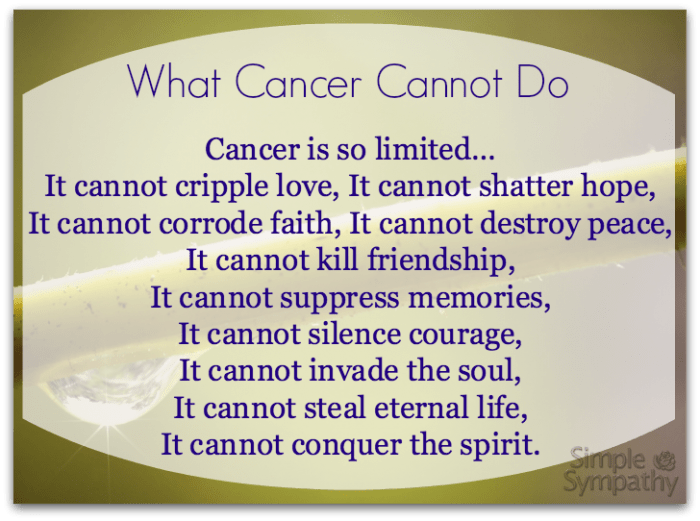In the face of a cancer diagnosis, individuals and their loved ones are often confronted with a whirlwind of emotions, uncertainties, and challenges. During these trying times, offering words of comfort and support can make a profound difference in alleviating their emotional burden.
This guide delves into the art of crafting heartfelt condolence messages for cancer patients, providing practical tips and guidance to convey empathy, understanding, and solidarity.
Condolence messages serve as a beacon of hope and encouragement, reminding cancer patients that they are not alone in their journey. They offer a lifeline of support, expressing genuine care and concern for their well-being. Whether it’s a written note, a verbal expression, or a thoughtful gesture, these messages can bring solace and strength to those facing the challenges of cancer.
Understanding Cancer and Its Impact
Cancer, a group of diseases characterized by uncontrolled cell growth, has a profound impact on individuals, families, and communities worldwide. With numerous types of cancer, each affecting different parts of the body and exhibiting diverse symptoms and prognoses, cancer poses significant physical, emotional, and psychological challenges.
The diagnosis of cancer can be devastating, triggering a range of emotions, including shock, denial, fear, and anger. Patients may experience anxiety about the future, uncertainty about treatment outcomes, and a sense of isolation as they navigate the complex healthcare system.
Cancer can also disrupt relationships, as family members and friends struggle to cope with the emotional toll of the disease and its potential impact on their loved one’s life.
Significance of Offering Condolences and Support
During such challenging times, offering condolences and support to cancer patients and their families is of utmost importance. Simple gestures of kindness and compassion can make a significant difference in their lives, providing a sense of comfort, hope, and solidarity.
Crafting Heartfelt Condolence Messages

In times of grief, expressing sympathy and support to those touched by cancer is a compassionate gesture that can provide comfort and solace. When crafting condolence messages for cancer patients, authenticity and empathy are key. Let your words convey genuine care, understanding, and solidarity.
Express Empathy and Understanding
Acknowledge the profound impact of the cancer journey on both the patient and their loved ones. Express your empathy and understanding of the emotional and physical challenges they are facing. Let them know you are there to listen and support them without judgment.
- Emphasize that you are there for them, offering your unwavering support and strength during this difficult time.
- Share your admiration for their courage, resilience, and determination in the face of adversity.
- Express your understanding that grief is a personal and unique experience, and that it is okay to feel a range of emotions.
Offer Comfort and Solidarity
Convey your heartfelt condolences and let the patient know that you are thinking of them. Offer words of comfort and solidarity that can bring a sense of peace and reassurance.
- Share memories or anecdotes that highlight the patient’s positive qualities and the impact they have had on your life.
- Remind them of the love and support that surrounds them, both from family and friends and from the broader community.
- Offer practical assistance, such as running errands, providing meals, or simply being present for them.
Use Genuine and Sincere Language
Choose your words carefully and avoid clichés or generic phrases that may come across as insincere. Instead, opt for genuine and heartfelt language that reflects your true emotions and conveys your deep care for the patient.
- Be specific and personal in your message, addressing the patient by name and referencing shared experiences or memories.
- Use phrases that express your admiration for their strength and resilience, such as “You are an inspiration to all who know you.”
- Share quotes or poems that resonate with the patient’s situation and offer comfort and hope.
Avoid Common Mistakes
Be mindful of certain phrases or actions that may inadvertently cause discomfort or offense to the patient or their loved ones.
- Avoid making comparisons or suggesting that the patient is “lucky” or “fortunate” compared to others.
- Refrain from offering unsolicited advice or medical opinions, as this may be perceived as insensitive or dismissive of their experience.
- Respect the patient’s privacy and boundaries, and do not pry into their medical details or personal life.
Addressing Specific Concerns and Needs

During their cancer journey, patients may grapple with a range of concerns and fears. By addressing these in your condolence messages, you can provide solace and comfort.
Acknowledge their strength, resilience, and determination. Remind them of the battles they’ve fought and won, and express your admiration for their spirit.
Offering Practical Support
Beyond words of comfort, consider offering practical support to ease their burden. This could include:
- Assistance with daily tasks: Offer to help with errands, chores, or meals, allowing them to focus on their health and well-being.
- Emotional support: Be a listening ear, offering empathy and understanding. Let them know they’re not alone in their struggles.
- Connecting them with resources: If you’re aware of relevant resources, such as support groups, financial assistance programs, or counseling services, share this information with them.
Using Language Sensitively
When communicating with cancer patients, it’s crucial to use language that is sensitive and respectful. Words can have a profound impact on a person’s emotions and well-being, and it’s important to choose them carefully.
Avoid dismissive or insensitive remarks that may inadvertently cause hurt or offense. Instead, opt for phrases that convey empathy, understanding, and support.
Tailoring Your Message
It’s essential to tailor your message to the individual’s preferences and beliefs. Some people may prefer direct and straightforward communication, while others may appreciate a more gentle and compassionate approach. Consider their personality, values, and cultural background when crafting your message.
Offering Hope and Inspiration
In the face of a cancer diagnosis, hope and inspiration can be powerful sources of strength and resilience. Sharing stories of individuals who have successfully navigated their cancer journeys can provide a sense of hope and encouragement to those currently battling the disease.
These stories can showcase the power of positive thinking, resilience, and support in the healing process.
Inspiring Stories of Triumph
- Highlight real-life stories of individuals who have faced cancer and emerged victorious. Share their journeys, challenges, and triumphs to demonstrate the resilience of the human spirit.
- Provide examples of individuals who have made significant contributions to society after overcoming cancer, demonstrating that a cancer diagnosis does not define one’s potential.
Positive Thinking and Resilience
- Emphasize the importance of maintaining a positive outlook and focusing on personal strengths during the cancer journey. Discuss how positive thinking can impact mental and emotional well-being, which in turn can influence the healing process.
- Share examples of how positive thinking and resilience have helped individuals cope with the challenges of cancer treatment and recovery.
Strength from Within
- Encourage cancer patients to draw strength from within themselves and their support systems. Remind them that they are not alone in this journey and that they have the inner strength to overcome challenges.
- Discuss the importance of self-care and self-compassion during the cancer journey, emphasizing that taking care of oneself is essential for maintaining physical and emotional well-being.
Providing Practical Support
Beyond words of comfort, offering practical support can make a significant difference in the lives of cancer patients and their families. Providing assistance with daily tasks, thoughtful gestures, and financial aid, if appropriate, can alleviate some of the burdens associated with the disease.
Assistance with Daily Tasks
Cancer treatment can be physically and emotionally draining, leaving patients with limited energy and resources. Offering help with daily tasks can ease their burden and allow them to focus on their recovery.
Running errands
Offer to run errands such as grocery shopping, picking up prescriptions, or paying bills.
Preparing meals
Provide home-cooked meals or arrange for meal delivery services to ensure they have nutritious and comforting food.
Transportation
Offer rides to appointments, treatments, or other essential destinations, especially if they have difficulty driving or using public transportation.
Thoughtful Gestures
Thoughtful gestures can brighten a cancer patient’s day and show them that they are not alone in their fight.
Care packages
Create care packages filled with comforting items such as soft blankets, cozy socks, snacks, and personal care products.
Support group
Arrange for a support group where patients can connect with others facing similar challenges and share their experiences.
Financial assistance
If appropriate, offer financial assistance to cover medical expenses, transportation costs, or other financial burdens.
Maintaining Long-Term Support
The journey of a cancer patient extends beyond the initial diagnosis and treatment. It’s crucial to maintain support throughout their entire experience, demonstrating empathy and providing practical assistance.
Staying Connected
- Regularly send messages or make phone calls to express care and concern.
- Check in on their progress, inquire about their well-being, and listen attentively.
- Offer ongoing practical assistance, such as running errands, providing transportation, or preparing meals.
Commemorating Milestones
- Celebrate the completion of treatment with a small gathering or a special meal.
- Mark anniversaries of diagnosis as a reminder of their resilience and progress.
- Acknowledge and celebrate milestones such as returning to work or engaging in favorite activities.
Closure

In the face of adversity, words have the power to uplift, inspire, and heal. By crafting thoughtful and compassionate condolence messages, we can provide a much-needed source of comfort and support to cancer patients. These messages serve as a testament to our collective humanity, reminding them that they are surrounded by a community that cares deeply about their well-being.
As they navigate their journey through cancer, our words can be a beacon of hope, a source of strength, and a reminder that they are not alone.
FAQ Section
How can I offer practical support beyond words of comfort?
Practical support can be invaluable to cancer patients. Offer assistance with daily tasks such as running errands, preparing meals, or providing transportation. Consider sending care packages filled with thoughtful items, arranging for a support group, or providing financial assistance if appropriate.
How can I maintain long-term support for cancer patients?
Maintaining long-term support is crucial. Stay connected with patients through regular messages, check-ins on their progress, and ongoing practical assistance. Celebrate milestones and achievements along the way, such as completing treatment or marking anniversaries of diagnosis.
What should I avoid saying in a condolence message?
Avoid dismissive or insensitive remarks, such as “Everything happens for a reason” or “Stay positive.” Respect the individual’s beliefs and preferences, and tailor your message accordingly. Focus on expressing empathy, understanding, and support rather than offering unsolicited advice.